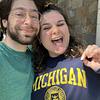Take a photo of a barcode or cover
2k reviews for:
The Omnivore's Dilemma: A Natural History of Four Meals AudiobookUnabridged
Michael Pollan, Michael Pollan
2k reviews for:
The Omnivore's Dilemma: A Natural History of Four Meals AudiobookUnabridged
Michael Pollan, Michael Pollan
I enjoyed this thought provoking book on food and its role in our lives and the world. I never put so much thought into food before, but I think it is important to take the time to consider our food more than we do. I came away from this book looking at food a lot differently than I did prior to its reading.
It's brilliant, obviously, without even being as harsh as it could be. Pollan holds off from actually drawing his own conclusions on the poisonous corn we're being pumped full of. He doesn't fully endorse Salatin's way because of how difficult it'd be to feed everyone like that.
Everybody should read this book and get rid of the falsehood that cheap food is in any way cheap.
Everybody should read this book and get rid of the falsehood that cheap food is in any way cheap.
has some really great content, and I was enthralled by the information, but at parts, the writing was a little dry. full disclosure: I did become a vegetarian a few weeks before reading the book, so I was well primed to be captivated by a book about sustainable food production, cafos, etc.
No ethical consumption under capitalism means literally the food you eat too! Gripping, saddening, only slightly hopeful
I first read this book during my undergrad years for an anthropology class. Looking back on it, I found this book to be well-meaning, and a good introduction to getting people to think about capitalism and the way we eat, but ultimately this book fell flat. Pollan's figures were a bit off, thus some of what he said was exaggerated.
Overall, I enjoyed the chance to think about how we eat and what changes we can make to preserve and strengthen our food system, but overall this book fell flat for me.
Overall, I enjoyed the chance to think about how we eat and what changes we can make to preserve and strengthen our food system, but overall this book fell flat for me.
Overall, it’s a fascinating book that I think is worth reading. He discusses so many aspects of how people get their food and the issues associated with them. I absolutely loved hearing about our relationship with the plants, fungi, and animals that humans consume. I can’t say that I was completely swayed by his argument to eat meat and hunt because I don’t think it’s as necessary or intrinsic as he says. Definitely worth a read but I will not be eating meat grass fed or locally hunted.
Interesting information, but pithy this book is not.
informative
reflective
sad
medium-paced
Where does our food come from and how much energy is it consuming on the way to our plates? This book examines the industrial food complex from corn fields to CAFOs, big organic to the small family farm and it shares insight into cultural and biological reasons for our eating habits. Though I found it slow at times, there are many interesting, funny, informative, and worth-while stories in this book. Pollan doesn’t give answers as to what we should be eating, but rather challenges us to really question where our food is coming from and how much of an impact we’re having on our world and our lives as we make our meal choices.


